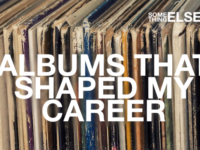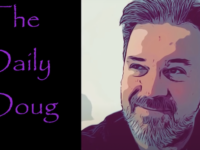On the one hand, Dave Bainbridge may be the best guitarist you’re not familiar with. On the other, he may be the best progressive rock keyboardist that’s flown under your radar. And on the third hand, maybe you’ve just not been paying attention, or at least not in the right places.
The graduate of the Leeds College of Music founded and played with the Celtic/Christian prog band Iona from 1990 until its dissolution in 2016. He’s toured as a duo with Sally Minnear, daughter of Gentle Giant mainstay Kerry Minnear, and played keyboards for the final version of Strawbs. Bainbridge has also released various collaborative and solo albums, the latter resulting in the band Celestial Fire. He currently plays guitar and keyboards for Downes Braide Association, Lifesigns and Circuline. Oh, and he’s also finishing off his latest solo album, On the Edge (Of What Could Be).
In conversation, Dave Bainbridge is soft-spoken, a far cry from his alternately soaring and searing playing. His sweeping arrangements incorporate everything from multiple keyboards, guitars and vocals to various percussion, violin, uillean pipes and his trusty bouzouki. Accepted into Leeds’s jazz program (as long as he promised to learn double bass, a project he says lasted six weeks), he graduated with a first-class pass, including distinction in arranging. Awards included the BBC Radio 2 Best Jazz soloist award (piano) and the Sam Hood Rosebowl for Outstanding Performance.
So perhaps his first choice among the albums that shaped his career isn’t that surprising:
KEITH JARRETT – FACING YOU (1972): It’s stream of consciousness, improvising creativity that blew me away. It was recorded in 1972 and it was 1977 when I first heard it, soon after I got to college. I’d heard jazz and classical piano but I’d never heard anything like that. It was spontaneously composed. I saw him play live at a couple improvisatory concerts. It was phenomenal. The lyrical way he played, improvising chords as well – it was quite amazing. He had phenomenal technique.
YES – CLOSE TO THE EDGE (1972): From the same year. It’s many people’s favorite. I started my first [college] band soon after. The bass player in my first band put it on. It was like nothing I’d ever heard before. I was playing piano and rudimentary organ, and the washes and layers of keyboards and the atmosphere – listening to it made me realize it was possible to create whole pieces with just my keyboards. It was a revelation to someone just playing piano. Most music I was listening to was pop, three minutes long. Close to the Edge was long form pieces, like the movements of a symphony. You could play rock and folk to create something a bit more abstract.
BBC SYMPHONY ORCHESTRA – RALPH VAUGHAN WILLIAMS, FANTASIA ON A THEME by THOMAS TALLIS (1991): It’s 17 minutes long, mainly strings. It was first performed in a cathedral, a massive space with amazing acoustics. That’s what he had in mind when he wrote the piece. It’s for string orchestras and string quartet. On this recording by the BBC Symphony conducted by Andrew Davis, he has the different ensembles in different locations. It’s ghostly and ethereal. The opening chords are fantastic harmonies. Chris Squire was a chorister – the end of “Soon” has parallel minor chords that are very Vaughan Williams-ish.
WHAT I’M LISTENING TO NOW: On the Edge (Of What Could Be). I’m just listening to our album. I have a pile of CDs I’m looking forward to hearing.
- Jon Anderson, Reza Khan, CSNY + Others: Ross Boissoneau’s Best of 2024 - December 30, 2024
- Tower of Power, Jennifer Hudson, Ben Folds + Others: 2024’s Seasonal Sounds - November 25, 2024
- Dave Bainbridge of Downes Braide Association: The Albums That Shaped My Career - October 9, 2024



